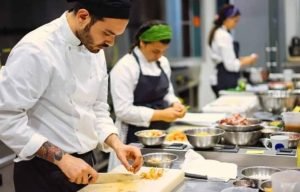Best Culinary Schools in Canada

Canada is one of the most popular tourist destinations in the world, ranking second only to the United States, followed by Australia and other countries. Many perks, such as famous colleges of learning that provide quality degree programs, scholarships for overseas students, and the beauty of the surroundings, have made Canada attractive among international students. Read on for a list of Best Culinary Schools in Canada.
As an international student, you will have the opportunity to gain experience in a new environment, participate in cultural activities, and more. Canada is not immune to this phenomenon, and you may be surprised to learn that it offers some of the greatest culinary schools in the world.
These culinary schools in Canada will educate you how to become a great chef by instilling in you the necessary skills, knowledge, and techniques to flourish in the sector and develop a successful career in the food industry.
Related Post:How Long does it Take to be a Chiropractor ?
Best Culinary Schools in Canada
Dartmouth, Nova Scotia Community College
This institution offers full-time culinary and pastry arts programs lasting one or two years, as well as shorter continuing education courses. Cheese making, wine pairings, employing tea in cocktails and dishes, cider making, and bartending are among the latter’s options.
Culinary Institute of Canada at Holland College
Canada’s Atlantic region contains some of the best seafood in the world. Local products such as cod clams, mussels, cod cheeks, salmon, and scallops are emphasised in Holland College’s Institute of Canada’s meals.
Canada’s Academy, St John
Students can choose between a 9-month pre-employment program for bakers or a 9-month pre-employment program for cooks. The apprenticeship program is accredited and available in the province of Newfoundland and Labrador. Depending on your curriculum, you may expect to spend roughly half of your time in a professional kitchen learning to produce delectable dishes and pastries.
The Institut de Tourisme et d’Hôtellerie du Québec
The Institut de tourisme et d’hôtellerie du Québec has a 50-year history as one of Canada’s finest culinary schools. It has amassed a tremendous network of both local and international partners, including Marriott, Club Med, and Michelin-starred restaurants, throughout the years.
Its restaurant, Restaurant de l’ITHQ, is a top-rated Montreal eatery that serves delectable Canadian cuisine and is staffed entirely by hospitality students.
LaSalle College’s Culinary School is located in Montreal, Quebec.
This is a 12-month curriculum for students interested in cooking and cuisine that is taught in both French and English. You’ll learn how to cook and prepare food, as well as how to organize and manage a kitchen and create specialized menus. A 5-week apprenticeship in a local restaurant is included in the program.
Stratford Chefs School is located in Stratford, Ontario.
The not-for-profit culinary school is known for training some of Canada’s greatest chefs and is located in the center of beautiful Canadian farmland. Carl Heinrich, the inaugural season winner of Top Chef Canada, received his education here.
Le Cordon Bleu, Ottawa
Le Cordon Bleu is the place to go if you want to learn how to cook French cuisine. This is a prestigious worldwide institution with a 125-year history of producing some of the world’s best chefs.
The school’s headquarters are in Paris, and all of its branches across the world follow the same curriculum. Students work and train at on-campus restaurants, and apprenticeships are available in some of the world’s best restaurants.
Culinary Arts School of Ontario
This is a culinary career college that focuses on teaching practical skills and encouraging culinary creativity while keeping tuition low. In comparison to similar schools in Ontario, tuition here is often less expensive.
Culinary arts, sous chef diploma, professional chef, and culinary management are the four programs available, each lasting 5 to 12 months. Students have the opportunity to work with industry specialists in real restaurant kitchens.
Ontario’s Liaison College, Hamilton
This is a private career institution with a reputable culinary school in Canada. It has a high job placement rate (95 percent), so you’ll have a good chance of finding work once you graduate.
The following programs are available:
- Basic and intermediate cooking classes are available.
- Chef de cuisine certification
- Specialist chef and personal chef courses in culinary management
- ME licensed, NACC member
- No regional accreditation in hospitality administration
Related Post:How Can I Become a Data Scientist ?
Durham College’s School of Hospitality and Horticultural Science is located in Whitby, Ontario.
Culinary students can enroll in a couple of programs at Durham College to master culinary skills and management. Culinary skills is a two-semester degree with very low tuition, whereas culinary management is a four-semester program.
Red River College, Winnipeg
Red River College exclusively provides courses to Manitoba residents due to high demand for its culinary arts program. It takes two years to complete a culinary diploma degree. As part of their practice, students run the campus restaurant and a public cafeteria.
What does it take to become a chef in Canada?
Aside from aspects such as talent and health, students must be free of skin and intestinal problems. Chefs must have their health checked on a regular basis because the job requires high hygiene.
Your height is not a thing to consider if you want to operate a restaurant. However, in order to work in a professional setting, a chef’s minimum height must be greater than 165 centimetres, as the equipment is set up to accommodate someone of that height.
Chefs not only prepare and cook food, but also plan menus, process food, and advise clients on what to eat and drink.
Working hard and being curious: by constantly learning new cooking channels and practicing on a regular basis.
Passion is the most important factor in every profession. Cooking is a difficult profession, therefore students who want to study it in Canada should think about it before enrolling.
Management and organizational skills: These two abilities will assist you in coordinating, organizing, and motivating employees.
Skills in planning: By creating menus, you can ensure that clients get the dishes they want at all times.
Control costs, minimize food expenditures, and increase corporate performance using financial management skills.
This is one of the criteria to know who is a good and passionate chef. Skilled and sensitive to taste, aesthetic: These skills can be trained in the process of working, but this is one of the aspects to know who is a good and enthusiastic chef.
Psychological characteristics such as thoughtfulness, meticulousness, and curiosity are more important than physical characteristics.
Related Post: Best PA schools in Colorado
Requirements for Culinary School
Cooking schools have different requirements; nonetheless, we can gather the fundamental and basic ones; yet, your favorite culinary school may ask for more. The following are some of the most common ones:
Applicants must have finished high school and present proof of completion, such as a diploma, official transcripts, GED, HISET, high school equivalency papers, or an authorized home school certificate.
A $25 non-refundable application fee could be more or less, and other institutions may not demand it at all.
Letters of recommendation
Thesis (topic vary by institution)
a valid photo ID
For international students, a study permit or a student visa is required.
TOEFL or IELTS for the English language, DELE for the Spanish language, DELF or DALF for the French language, and DSH, TestDAF, OSD, or TELF for the German language are examples of language competence examinations (may not be required by some schools)
With these qualifications in hand, you can investigate the culinary schools in Canada listed below and apply to the one that best meets your needs.
Experience
There are a few other things you’ll need to get before you apply, in addition to the legal documents. Most culinary schools require that you have prior work experience in a restaurant or a formal kitchen. Working at a fast food joint like McDonald’s or Kentucky Fried Chicken may not provide you with the necessary experience. This is because you’ll be learning fine food preparation in a professional setting, and they might expect you to know the difference between a julienne and a diced onion. Before you choose culinary school, ask the admissions director what kind of work experience they want and how long you should be working. Frequently, half a year or more is required. Having a passion for cooking is the most important factor in becoming an outstanding chef! How can you be confident that becoming a chef is something you want to do if you’ve never worked in a formal kitchen?
You’ll also need letters of recommendation from people who have seen your work in an academic or culinary setting, in addition to your employment experience. The perfect candidate would be a teacher or boss who is familiar with your work’s quality. You should ensure that the person producing your letter of recommendation is proficient in English so that it will be easily understood by others who will read it.
There is no set number of letters you should have, but three letters from persons who are familiar with your work should be enough. Schools can be picky about receiving a sealed letter from the individual you’ve asked for a recommendation, so double-check with yours.
Finally, be sure that the school you want to attend has the kinds of programs and coursework that you want to take. Just because a school offers a culinary arts degree program doesn’t imply you’ll be able to learn anything you want, such as classical French or Italian cuisine. Another smart idea is to reach out to chefs whose work you appreciate and inquire about the program you’re interested in attending.
These are just a few suggestions for things you should consider before enrolling in culinary school. You should review the details with your admissions representative to ensure that nothing stands in the way of you achieving your ideal career.
Opportunities for employment
Cookery in Canada usually requires a large human resource because the country receives tens of millions of visitors each year. Tourists are a major source of foreign currency income, amounting to tens of billions of dollars. Chefs, head chefs at restaurants, and hoteliers are always overworked.
Young cooks in Vietnam, particularly those who have completed their studies outside of the country, enjoy a plethora of high-paying career options at prestigious hotels in major cities such as Hanoi, Ho Chi Minh, and others. Chefs with extensive training are eligible for annual allowances, wages, bonuses, commissions, and sales.
Furthermore, food cleanliness and safety are always top priorities, and the regulations are becoming increasingly demanding. In this industry, the careful selection of human resources results in a high level of service. As a result, students who study Cookery in Canada will have a wide range of professional opportunities.
FAQs
Is Canada a good place to learn about cooking?
Canada is not one of the best places to study culinary arts; countries such as Peru, France, Italy, the United States, Australia, and Japan lead the way. Culinary arts degrees are available in Canada at universities and colleges.
What is the duration of a culinary school in Canada?
In Canada, a diploma in culinary arts takes two years, whereas a bachelor’s degree in culinary arts takes three to four years, depending on the institution.
In Canada, how much does cooking school cost?
The cost of culinary school in Canada varies depending on the program and the student’s location. It is, as is customary, less expensive for domestic students and more expensive for overseas students.
Culinary schools in Canada cost between $6,550 and $11,200 a year for domestic students, depending on the program. International students pay between $9,220 to $27,912 in tuition.
In Canada, how much do chefs earn?
Chefs in Canada make an average of 72,000 CAD each year, but wages range from 35,500 CAD (lowest) to 113,000 CAD (highest) (highest).
After you’ve answered these questions, carefully review the requirements for culinary schools listed below; you’ll need them to prepare for your admission application, which will help you get in.









